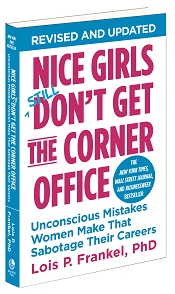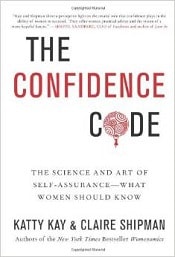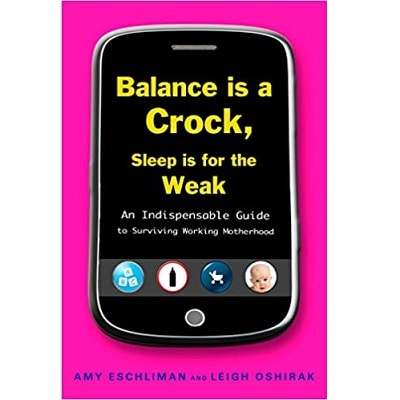How to Handle Imposter Syndrome
This post may contain affiliate links and Corporette® may earn commissions for purchases made through links in this post. As an Amazon Associate, I earn from qualifying purchases.

Here's something we haven't discussed recently: how to handle imposter syndrome. If you're not familiar with imposter syndrome, it's that lovely feeling that you're successful because you're tricking everyone about your intelligence or insights, that you're the recipient of incredible luck to have come this far, and that any day now someone will figure you out and have you booted out of the office or classroom. *Cough.* Not to be too specific or anything. Imposter syndrome has been on my mind lately because I read this great anecdote in Forbes about a lobster at a court party:
[Elizabeth] Gilbert writes [in Big Magic*] about an American striving to break into the French art world when he finds himself invited to a costume party at a castle filled with French aristocrats.
He spends a week meticulously assembling an elaborate ensemble, only to drive three hours to the party and realize he had missed a key detail: the theme of the party was “a medieval court”, and he was dressed as a lobster.
Much like the beloved protagonist in Legally Blonde, instead of running away in embarrassment, he rocked his costume, complete with red tights, face paint and giant foam claws. With all the confidence and charm he could muster, he bowed deeply to the assembled royalty and introduced himself as the court lobster. They loved him. He quickly became a celebrated guest of the event, ultimately dancing with the Queen of Belgium.
(* Affiliate link. Pictured at top: lobster costume for your office Halloween party, anyone? This one is $60 at Amazon (affiliate link). There's also this fetching lobster hat (affiliate link).)
The Forbes article goes on to recommend that we apply “Court Lobster Strategy” in our own lives, building our confidence and feeling empowered “through a sense of playfulness and courageous action in spite of our moments of doubt.”
I love this attitude! As I've gotten older I definitely find myself aligning with Tina Fey's quote about realizing that “almost everyone is a fraud, so I try not to feel too bad about it.” I also tend to be of the “bluster through as best you can” mentality — which we've talked about before with the idea about saying yes to work you're not ready for. (Another great Tina Fey quote here: “Say yes and figure it out later.”)
I'd love to hear from you guys: What are your best tips for how to handle imposter syndrome? Some other common tips for imposter syndrome that I've read before are below…
- Recognize it in yourself and others. Dr. Valerie Young has identified five different kinds of people who suffer from imposter syndrome, and this Muse article suggests ways to deal with each flavor. As Gill Corkindale has written for the Harvard Business Review, imposter syndrome may be linked with perfectionism — feeling as if you “must not fail,” feeling like a fake or undeserving of success because somehow “others have been deceived into thinking otherwise.” New York even has a test to find out how bad you're suffering from imposter syndrome.
- Remind yourself it's normal to not know everything, and that if you're new at something or doing something for the first time, it's ok to have a learning curve.
- Focus on how much you're learning — not how you're “performing.” As professor Andy Molinsky writes in Harvard Business Review, working to cultivate a learning mindset helps you experience your limitations “quite differently. Your mistakes are seen as an inevitable part of the learning process rather than as more evidence of your underlying failings.” Another tip here: Remind yourself how far you've come and what you've already learned.
- Focus on what problems you solve or skills you bring. This tip comes to us from Kate White via Natalie Dormer (as reported in Forbes): Focus on what you can bring to the situation or how you can solve a problem, instead of how you'll look and sound and what people might think.
How about you, ladies: What are your best tips on how to handle imposter syndrome? Do you feel like you've been able to move through your issues dealing with imposter syndrome, or do you feel like it's a work in progress? What tricks for handling imposter syndrome work the best for you?
Psst: you may want to check out our previous articles about executive presence for women, applying for jobs when you meet less than 100% of the listed job requirements, and how to move past career hiccups and mistakes you've made.
Some must-read business books for women — update coming soon!






Rainbow Hair mentioned this in the morning thread – assemble your happy folder with evidence of successes. It’s too easy to get depressed when you fail at something. That’s when you go back to the folder where you collect emails/notes where someone gave you praise for a job well done, acceptance letters, certificates for degrees and other achievements that you worked hard for, letters of recommendation somebody wrote for you, invitations for conferences and so on. Major confidence boost!
Similar to that, I keep a running page in my OneNote notebook of [Current Year] Accomplishments. Every Friday or so, I take a minute to jot down 1-2 things I’ve done well over the last week or two. If it was a BIG project, I star it so it stands out. If I got any thank you emails, I add a subbullet. “Developed and rolled out ABC training to group of 50. (sub) Received thanks and praise on my “excellent presentation demeanor” from managers X, Y, and Z.”
It helps tremendously when it comes time for performance reviews (at my company, you write your own and submit to your boss for comments) because with 50 or so examples, I’ve usually got numerous “wins” for each of my goals. I can lead with the relevant big one and add any others that have impressive praise.
I also print them out and keep them in a folder at home. I figure if I ever need to interview somewhere else, they’ll be good prep for the “tell me about a time when….” questions.
To be honest, I got over imposter syndrome when I was younger, partly because I had a few incredibly awful people in my life. They worked *so hard* to undermine me, and eventually, I figured out that they needed to work that hard because I was the opposite of the stupid little fool they wanted me to be.
I don’t recommend this route to avoiding imposter syndrome, but there are a lot of terrible people out there who are more than happy to see you hate yourself. Why help them in their awful endeavour?
When I was in law school, lots of men suffered from this syndrome. They thought they knew EVERYTHING, and that we women were just dummies that were there to provide them with satisfaction. We had no brains in their view and they did NOT care what we thought. All we had to do was to please them, and then keep our mouthes shut. FOOEY on them! I am now a partner even tho most men thought I would just sleep with my professors and never amount to anything. DOUBEL FOOEY on that! I say if you meet men like this, ignore them! You can do better then sleep with loosers like these men. Besides, they are not good in bed anyway. TRIPEL FOOEY!
Ah, one of the oldest questions I think both I and most other women in their 20s struggle with when starting their careers. I think one thing that helps is to realise that most people fake it to some extent. And that the reason you don’t know things, is just that you haven’t been in that exact situation before — but now you have, and you will know better next time. I think incorporating a growth mindset helps. Your skills and and capabilities aren’t fixed. The only way to learn is to realise that you don’t know everything right away.